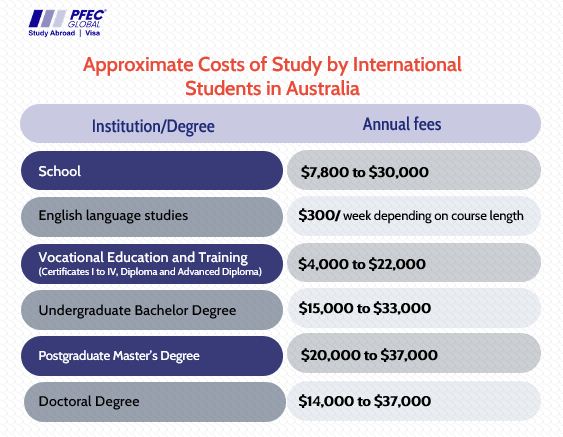

Studying abroad is a life-altering adventure that opens doors to new cultures, experiences, and opportunities. Among the plethora of global study destinations, Australia stands tall as a sought-after choice for international students.
Australia provides a myriad of educational opportunities for foreign students, boasting over 1,200 institutions and more than 22,000 course options for eager learners. International Students can pursue education at every tier, from elementary and high school to vocational training and English language classes, extending to tertiary education, including undergraduate, postgraduate, and research programs.
No matter the course or its duration, Australian regulations ensure top-notch education and safeguard the rights of international students. Unsurprisingly, Australian cities frequently top the list of the world's most habitable and student-accommodating cities.
If you're considering embarking on this educational journey, let's dive into a more elaborate exploration of each step to ensure you're well-prepared for your Australian education experience.
Australia boasts eight universities that feature in the top 200 of the QS World University Rankings 2022. Moreover, the majority of Australian universities rank within the top 1% to 2% globally.
Australia's appeal as an international student destination is rooted in several distinctive factors that shape the lives of students in remarkable ways.
Australian universities consistently rank high on the global education stage. Institutions like the University of Melbourne, Australian National University, and University of Sydney are known for their academic excellence and innovative research. The emphasis on practical, hands-on learning ensures that graduates are well-equipped for the real-world challenges in their chosen fields.
Variety is the spice of academic life in Australia. The country offers an extensive range of courses, catering to every interest and career aspiration. Whether your passion lies in engineering, business, arts, or sciences, you can find a program that aligns with your ambitions.
Australia recognizes the importance of work experience in shaping a student's career. The student visa allows you to work up to 40 hours per fortnight during the academic term and full-time during semester breaks. This not only assists with managing your expenses but also enables you to gain practical experience in your field of study.
A platform named "CareerHub" operates across 36 Australian universities, facilitating connections between employers and qualified graduates. This makes it easier for students to find graduate job opportunities.
Most educational institutions in Australia possess robust career support departments, where the primary objective of the staff is to assist foreign students in securing employment and, subsequently, a work permit.
Diversity isn't just a buzzword in Australia; it's a way of life. The nation prides itself on its multiculturalism, offering an environment where students from all corners of the globe can interact, learn, and thrive together. This exposure to various cultures enriches your educational journey, fostering global perspectives and lifelong friendships.
Australia's commitment to nurturing global talent is evident in its post-study work opportunities.

This allows you to gain practical experience and potentially secure long-term residency.
For more compelling reasons read our blog “Why should you Study in Australia: Top 9 Reasons for Indian Students”.
The foundation of your Australian education journey starts with research. Begin by exploring Australian universities and their offerings. Websites such as Study in Australia and QS World University Rankings are valuable resources that provide insights into course details, faculty expertise, campus facilities, and more. At PFEC Global we have PIER Certified International Education Consultants to help you through. Save your time and energy and book an appointment with us.
With the multitude of courses available, take your time to narrow down your interests. Consider factors like course duration, tuition fees, location, and available scholarships. Evaluate institutions based on their global reputation, faculty credentials, and industry connections.
Australian educational institutions provide a broad spectrum of courses, encompassing fields such as business, technology, arts, and sciences, alongside professional certifications.
Whether you're keen on pursuing an undergraduate degree with multiple focuses or two distinct Masters, Australia caters to your academic aspirations. The country boasts 39 universities, inclusive of the renowned Go8 Universities.
At PFEC Global we help you choose the course which is fit for you based on your academic background, marks obtained and last but not the least, emphasising on your futuristic career prospects.
Admission requirements for Indian students vary depending on the level of study (undergraduate, postgraduate, etc.). You can know more about this from expert Consultants at PFEC Global.
Once you've identified your preferred courses and institutions, proceed with the application process. Most Australian universities offer online application platforms on their official websites. Pay close attention to application deadlines and ensure that all required documents are submitted accurately.
Here are the approximate costs that will be incurred by international student in Australia:

For more information read our blog “Cost of study in Australia”
Acquiring a student visa is a crucial step.
Apply for the 𝐒𝐭𝐮𝐝𝐞𝐧𝐭 𝐕𝐢𝐬𝐚 (𝐒𝐮𝐛𝐜𝐥𝐚𝐬𝐬 𝟓𝟎𝟎) through the Australian Department of Home Affairs website. This visa allows you to study a full-time course at an Australian educational institution. You'll need to provide proof of enrollment, health insurance, and enough funds to support yourself during your stay. You'll need to provide proof of enrolment, health insurance coverage, and financial capacity to cover tuition fees and living expenses.
For more information read our blog “Guide to Student Visa for Australia”
Managing your finances is essential for a smooth educational journey. Calculate the estimated expenses, including tuition fees, accommodation, living costs, transportation, and additional study-related expenses. Research scholarships available for international students and apply for those that align with your academic achievements and aspirations.
Scholarships and Financial Support:
Australia provides a range of scholarships for international students, each tailored to different academic achievements, courses, and levels of study. Some prominent scholarship options include:
For more information read our blogs “Scholarships to study in Australia”
Once your student visa is granted, plan your arrival in Australia. Many universities offer orientation programs to assist international students in settling in. These programs provide essential information about campus facilities, academic expectations, and living in Australia. Use this time to familiarize yourself with your new environment and connect with fellow students.

Balancing work and studies is a key aspect of the Australian education experience. The ability to work part-time during academic terms and full-time during breaks provides you with financial independence and valuable work experience. Explore opportunities related to your field of study to enhance your skill set.
Overseas Student Health Cover (OSHC) is mandatory for all international students in Australia. This insurance covers medical services and hospital care, ensuring you have access to quality healthcare during your stay. Compare different OSHC providers to find the coverage that suits your needs.
Australia's vibrant culture offers an array of experiences waiting to be explored. Engage in local festivals, cultural events, and community activities to immerse yourself fully. This not only enriches your personal journey but also provides insights into Australian society.
Upon completing your studies, you have various avenues to continue your journey in Australia.
The Temporary Graduate visa (subclass 485) is a popular choice that allows you to work, gain practical experience, and potentially transition to permanent residency.
Research and understand the visa options available to you, and plan your career trajectory accordingly.
For international students in Australia, upon completing a qualification (lasting at least two years) such as a Bachelor’s Degree or a Masters by Coursework Degree, you are eligible for post-study work opportunities for up to two years. Those with a Masters by Research degree can access work opportunities for three years, while PhD graduates can do so for up to four years.
When planning your educational journey in Australia, one critical consideration is where you'll reside. The good news is that many international students who've made Australia their academic destination report satisfying living arrangements. Adapting to a new environment might pose initial challenges, but with time, students often regard their stay as an invaluable aspect of their journey.
For newcomers, opting for university-managed residences is a popular choice. This typically includes shared communal areas, like kitchens or lounges, while retaining the privacy of an individual bedroom. While some university residences offer en-suite facilities, it's not uncommon for students to share amenities with a group of their peers, ranging from a couple to a dozen.
As students transition into their subsequent years, they often explore a wider array of housing options. From co-living in a rented house with fellow students to availing themselves of specialized student accommodation services, Australia presents a plethora of housing alternatives tailored to diverse needs and preferences.

Australia offers a vibrant and inclusive campus life for international students. Universities in Australia provide a range of activities, clubs, and events that encourage student engagement and interaction.
This creates a dynamic atmosphere for cultural exchange, making it easier for international students to integrate and build friendships. The campuses are equipped with modern facilities, libraries, sports centres, and cultural spaces, fostering a conducive environment for both academic and extracurricular pursuits.
Australia's multicultural environment is reflected in its diverse food scene. On-campus cafeterias and dining halls offer a variety of cuisines to cater to different tastes and dietary preferences.
Off-campus, students can explore local eateries, restaurants, and food markets that serve dishes from around the world. Additionally, major cities have grocery stores where students can purchase ingredients and cook their meals, which can be cost-effective and allow them to enjoy home-cooked food.
The cost of living for international students in Australia varies based on factors like location, lifestyle, and accommodation choices. Generally, major cities like Sydney, Melbourne, and Brisbane have higher living costs compared to regional areas. Rent, transportation, and entertainment contribute to the expenses.
You can manage costs by opting for shared accommodation, using public transportation, and budgeting wisely. It's essential to research and plan ahead to ensure that living expenses are manageable within the allocated budget.
While expenses vary based on factors like location and lifestyle, you can expect an average annual living cost of around AUD 20,000 to 27,000. This covers accommodation, food, transportation, utilities, and other essentials.
And Finally, As an international student, your safety is assured. The Education Services for Overseas Students (ESOS) Act 2000 and the National Code of Practice for Registration Authorities and Providers of Education and Training to Overseas Students 2007 (National Code) establish uniform standards for education providers and international student training.
Hence, it's essential that as an international student holding a student visa, you choose an educational institution and program that are officially registered on the Commonwealth Register of Institutions and Courses for Overseas Students (CRICOS).
CRICOS registration ensures that both the course and institution meet the high benchmarks anticipated by international students.
The ESOS framework safeguards the rights of international students studying in Australia. This includes the right to receive accurate, up-to-date information about courses, fees, study modes, and other details from your chosen educational institution and its representatives.
The ESOS framework showcases the criteria that Australian institutions must fulfill when offering education and training services to international students. These standards encompass various essential information and services, such as orientation and access to support services that aid your studies and adaptation to life in Australia."
Choosing to study in Australia is a transformative decision that can shape your personal and professional trajectory. Offering a harmonious blend of quality education, breathtaking landscapes, and diverse cultural experiences, Australia is indeed a land of possibilities.
This comprehensive guide equips you with the knowledge needed to navigate the process successfully. From selecting the right course and institution to understanding post-study pathways, financial considerations, and cultural experiences, your Australian education journey promises to be one of growth, learning, and unforgettable memories.
Embrace the opportunities, engage with the diverse community, and embark on this educational adventure with confidence. Your Australian dream awaits!

Studying abroad is an exciting and life-changing experience that offers students a chance to gain a global perspective and valuable exposure ...

In our rapidly globalizing world, where boundaries are melting away and opportunities abound, proficiency in the English language has become ...

Choosing to pursue higher education abroad is an exciting and life-changing decision. Among the plethora of options available to internationa...

Australia, renowned for its world-class education and diverse cultural experiences, continues to be a favoured destination for international ...

Australia is not just famous for its iconic Sydney Opera House, the Great Barrier Reef, and its unique wildlife; it is also recognized global...

Studying abroad is a life-changing decision, and with so many options available, it can be overwhelming to choose the right country and univers...

As of March 2022, Australia has seen a consistent rise in its international student numbers, with enrolments reaching 440,219. This marks an ...

In the coming, international students continue to be drawn to the United Kingdom for its world-class education and diverse cultural experiences...